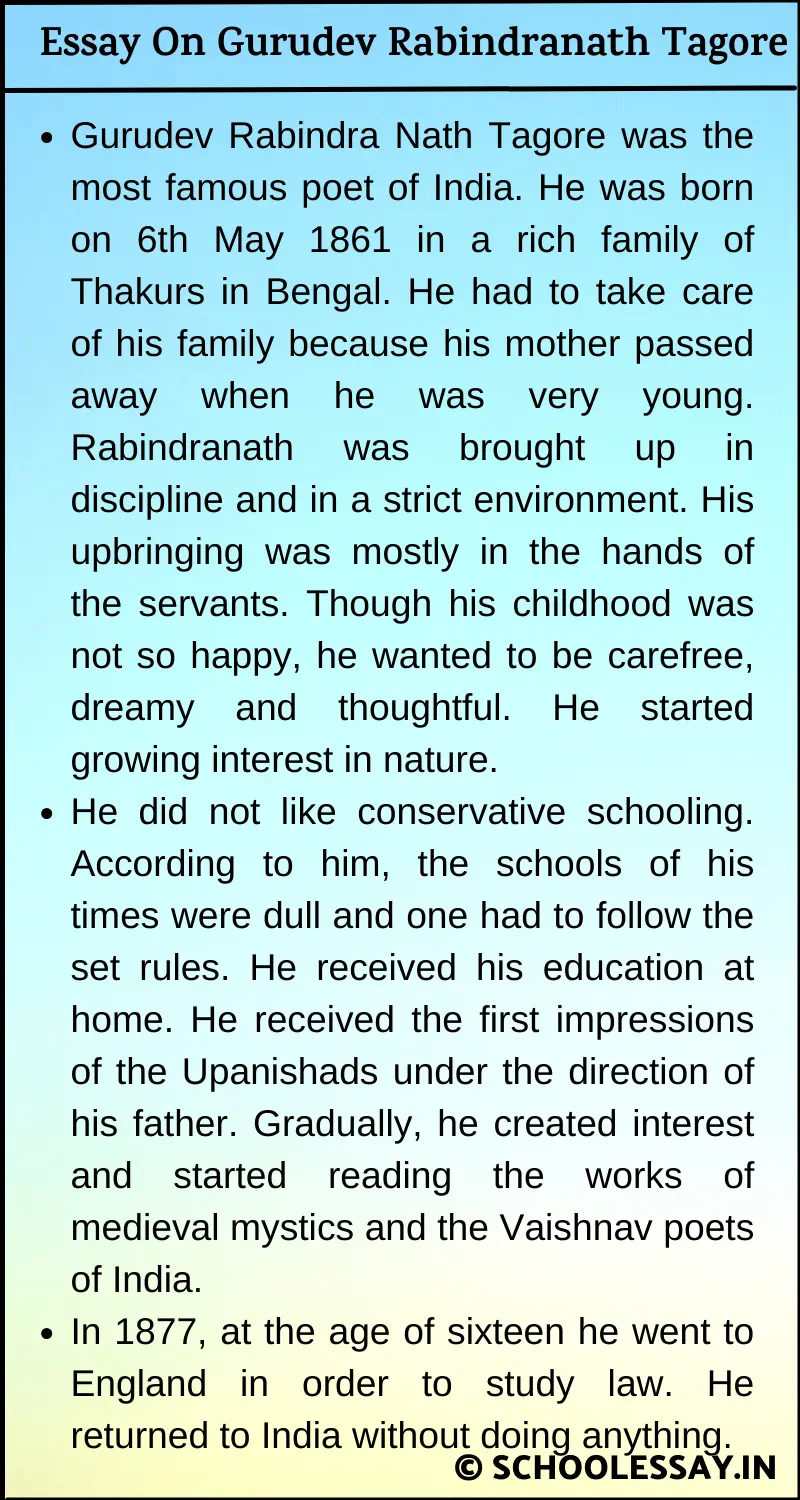Set 1: Essay On Gurudev Rabindranath Tagore
Gurudev Rabindra Nath Tagore was the most famous poet of India. He was born on 6th May 1861 in a rich family of Thakurs in Bengal. He had to take care of his family because his mother passed away when he was very young. Rabindranath was brought up in discipline and in a strict environment. His upbringing was mostly in the hands of the servants. Though his childhood was not so happy, he wanted to be carefree, dreamy and thoughtful. He started growing interest in nature.
He did not like conservative schooling. According to him, the schools of his times were dull and one had to follow the set rules. He received his education at home. He received the first impressions of the Upanishads under the direction of his father. Gradually, he created interest and started reading the works of medieval mystics and the Vaishnav poets of India.
In 1877, at the age of sixteen he went to England in order to study law. He returned to India without doing anything. Writing poems had attracted him from an early age of fifteen. His poems were praised and he received fame. His thoughts and feelings could be reflected through his poems. His early poems were given the title of Morning Songs’. Before he turned eighteen, he had succeeded in publishing over six thousand lines of verses and a great quantity of prose. He came to be known as the ‘Lapsing Poet’ and the Bengali Shelley’.
Rabindranath was a great patriotic. He spoke against narrow nationalistic beliefs. He wrote vigorous political poems, essays and songs. Although Rabindranath was a good friend of British for their qualities of discipline and leadership, he fought against their rule in India. He always left a deep and unforgettable impression on everything around him. His philosophic way to lead life not only won him great fame in India but also around the world.
Late 1910s and early 1920s saw progressive years in literacy activities. In 1909, Gitanjali, a book in Bengali poetry was published. For this book, he won the Noble prize for literature. In 1901, he founded a school called ‘Shantiniketan’. His school won him international fame. He wanted to make this school a model of the old Indian tradition of Gurukul’. He was also awarded Knighthood for his service to art and literature. However, as a mark of protest against the British rule in India, he resigned it.
This great master of literature passed away on 7th August 1941. Honoured as a renowned world poet, educationalist, artist, freedom fighter, actor, novelist, playwright, philosopher and social reformer he was a proud son of India.

Set 2: Essay On Gurudev Rabindranath Tagore
Rabindra Nath Tagore was born on 6th May, 1861 in a wellto-do family of Thakurs of Bengal. His mother died when he was quite young, so his father, Devendranath, had to look after him.
Rabindra Nath was averse to studying at conventional schools from the very beginning. He disliked the set rules and the monotonous life that schools of those days provided. He was up to freedom of the body and the soul. He was, therefore, allowed to receive education at home. Yet progress was very slow. Rabindra Nath loved to be carefree, dreamy and thoughtful. His love for nature grew with years. At the age of 16 he was sent to England but he 201 returned home after some time, without doing anything.
He started writing poetry at the early age of 15. Very soon his poetry brought him name and fame. It reflected his thoughts and feelings. His early poems were given the title of “Morning Songs.”
Simultaneously with poetry, Tagore was writing dramas and prose. Though his earlier plays are more like literary exercises, and reveal him more as a painter than a dramatist, yet ‘The Post Office” written in later years was given a great reception. He wrote a number of stories and novels. The short story ‘Kabuliwallah is one of his best productions.
Tagore was a lover of mankind. His love for the countryside and the calm, still beauty of the jungle did not diminish his love for the suffering humanity. He took part in politics and led an agitation against the partition of Bengal. He resigned his knighthood in protest against the British attitude towards the Indians.
Tagore initiated a new system of education. He opened a school at Santiniketan. The emphasis here was on doing manual work in the open air. The relationship between the boys and their teachers was one of close intimacy. Tagore wanted to make this school a model institution for the preservation of the essential spirit of India. He laid stress on making students self-reliant in life. He drew great spiritual comfort in the solitude that pervaded around Santiniketan.
Tagore became very famous with the writing of “Gitanjali”. He was honoured with the Nobel Prize for literature in 1913 for Gitanjali. This is a collection of 103 songs which express intense love for Nature. This book has been translated into many languages of the world. It is said that even if Tagore had not written anything else, his fame would not have been any the less.
In India it is difficult to come across people like Tagore. He was a great philosopher, artist, philanthropist all combined into one. He died in 1941.
ALSO READ:
- Essay On Greenhouse Effect
- Essay On Good Health
- Essay On God Helps Those Who Help Themselves
- Essay On God Gifts A True Friend
- Essay On Genetic Engineering
- Essay On Global Terrorism
- Essay On Free Year After School
- Essay On Extra-Curricular Activities Educate More Than Classroom Teaching
- Essay On Effect of Crime Stories
- Essay On Family Planning



